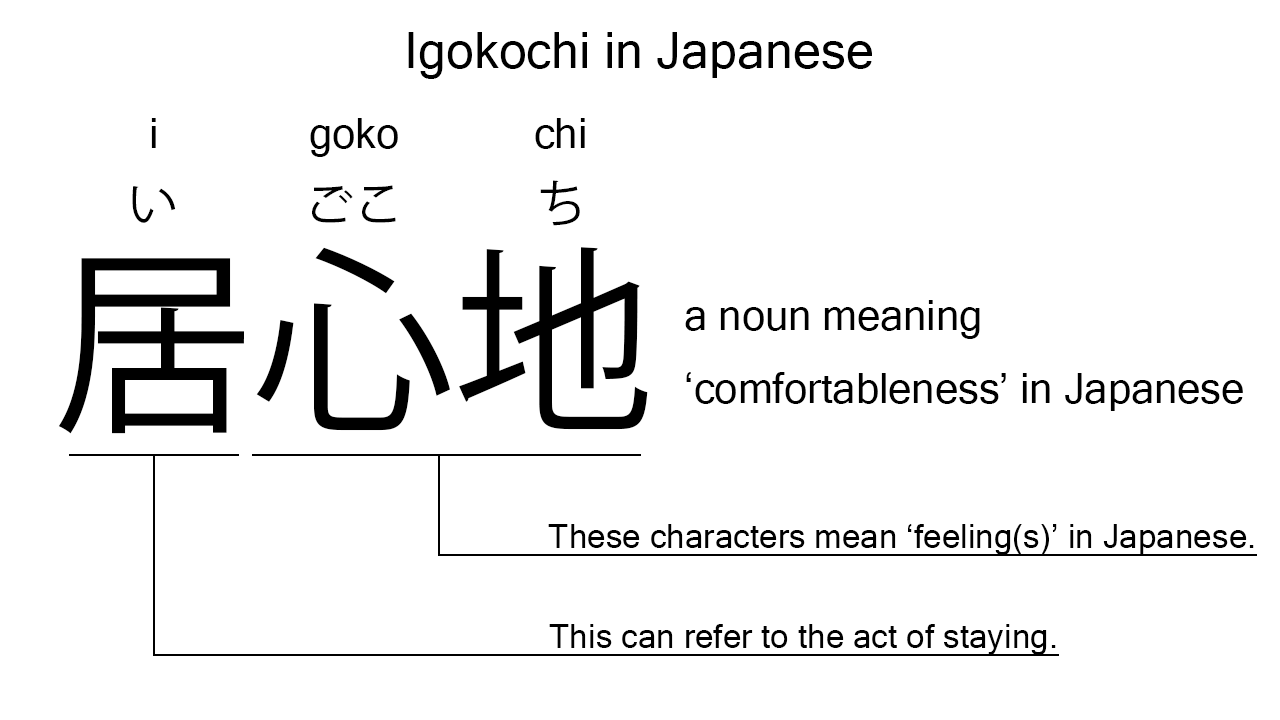What does “igokochi” mean in Japanese?
Native speakers say “igokochi” to mean ‘comfortableness’ in Japanese. Perhaps, some Japanese learners know this word as it is sometimes used in Japanese movies, songs, novels, manga, anime, and the like. In this blog post, however, I will explain this word in detail based on its kanji expression. And also, I will explain how to use it through example sentences. My explanations would help Japanese learners understand “igokochi” more clearly. Then, let’s get started!
Contents
Definition and meaning of “igokochi”
Let me start with the definition and meaning of “igokochi”.
- igokochi – 居心地 (いごこち) : a noun meaning ‘comfortableness’ in Japanese.
Japanese native speakers use this noun to refer to the comfortableness of a room, house, or more generally space.
The definition and meaning are simple and clear. To understand this noun more clearly, however, let me explain its kanji characters in detail.
Igokochi in kanji
The kanji expression of “igokochi” consists of the following two parts:
- 居 : a kanji character often used to refer to the act of staying.
- 心地 : kanji characters often used to mean ‘feeling’ in Japanese.
These two parts tell us that “igokochi” can mean a ‘feeling which someone has when they stay somewhere’ in Japanese. This literal interpretation is not completely in line with the actual meaning, but still very close, I think. Japanese native speakers use this noun to refer to the quality of the place where they are. Their minds can easily be affected by the quality.

When we meet new kanji expressions, we should check their kanji characters in detail to understand their meanings clearly and deeply. In many cases, kanji characters tell us a lot about the meanings of the expressions they form. Actually, here, we could get the better understanding of “igokochi” through the detailed kanji check above.
So far, I’ve explained the definition and meaning of “igokochi” together with its kanji characters. Then, let me explain how to use it through the example sentences below.
Example #1: how to say “comfortableness” in Japanese
boku no heya no igokochi ga suki – 僕の部屋の居心地が好き (ぼくのへやのいごこちがすき)
I love the comfortableness of my room.
Below are the new words used in the example sentence.
- boku – 僕 (ぼく) : a pronoun meaning ‘I’ in Japanese. This is used mainly by boys and young males.
- no – の : a case particle used after a noun or pronoun to make its possessive case. In the example, this is used after “boku” to make its possessive case, “boku no”, which means ‘my’ in Japanese.
- heya – 部屋 (へや) : a noun meaning ‘room’ in Japanese. This can also work as plural. Learn more about Japanese plural.
- no – の : a case particle joining two nouns or noun equivalent words. Normally, the first one can work as a modifier to describe the second. In the example, this works to join “boku no heya” and “igokochi”. The formed phrase literally means ‘the comfortableness of my room’ in Japanese. Word orders in Japanese and English are different, but the role of this case particle is similar to that of the English preposition, “of”.
- ga – が : a case particle used to make the subject word or the object word in a sentence. In the example, this is used after “boku no heya no igokochi” to make the object in the sentence.
- suki – 好き (すき) : the stem part of the na-adjective, “sukina”, which means ‘favorite’ in Japanese. In reality, native speakers often use this as an individual word to mean ‘to like’ or ‘to love’ in Japanese. In the example, this is used to mean ‘to love’.
This is a typical usage of “igokochi”. In this example, it works as a part of the noun phrase, “boku no heya no igokochi”, which means ‘the comfortableness of my room’ in Japanese.
Example #2: another usage of “igokochi”
igokochi wa totemo ii – 居心地はとても良い (いごこちはとてもいい)
It is very comfortable.
Below are the new words used in the example sentence.
- wa – は : a binding particle working as a case marker or topic marker. In the example, this works after “igokochi” to make the subject in the sentence.
- totemo – とても : an adverb of degree meaning ‘very’, ‘much’, ‘so’, or such in Japanese. In the example, this works in front of “ii” to emphasize its meaning.
- ii – 良い (いい) : an i-adjective meaning ‘good’ in Japanese.
This is another typical usage of “igokochi”. In this example, it works together with the i-adjective, “ii”, to mean ‘comfortable’. The literal meaning of the Japanese sentence is more like ‘the comfortableness is good’, though.
Summary
In this blog post, I’ve explained the definition and meaning of “igokochi” in detail based on its kanji expression. And also, I’ve explained how to use it through the example sentences. Let me summarize them as follows.
- igokochi – 居心地 (いごこち) : a noun meaning ‘comfortableness’ in Japanese. These three kanji characters can mean a ‘feeling which someone has when they stay somewhere’ in Japanese. This literal interpretation is not completely in line with the actual meaning, but still very close, I think. Japanese native speakers use this noun to refer to the quality of the place where they are. Their minds can easily be affected by the quality.
Hope my explanations are understandable and helpful for Japanese learners.